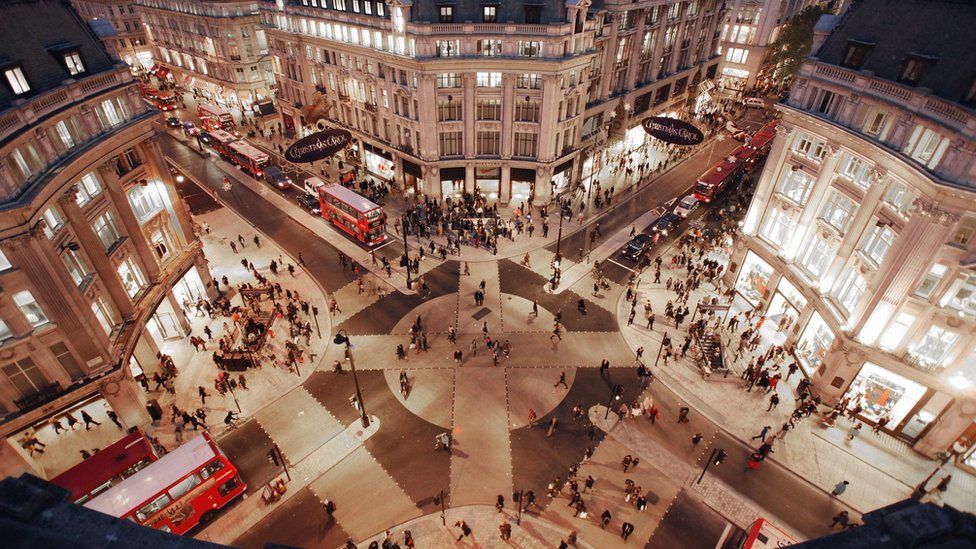Oxford Street to be pedestrianised by 2020
- Published

The traffic ban will first be implemented on the eastern section between Tottenham Court Road and Oxford Circus
Oxford Street will be pedestrianised by 2020, the mayor of London's office has said.
All traffic including buses and taxis will be banned from the shopping street - one of the most famous in the world - as part of Sadiq Khan's plans to tackle air pollution.
More than four million people visit Oxford Street each week.
City Hall said the project would be rolled out in two stages to reduce disruption on the 1.2-mile street.
Cars are already banned on most of Oxford Street between 07:00 and 19:00 every day apart from Sunday.
'Far safer'
Valerie Shawcross, London's deputy mayor for transport, told the London Assembly on Wednesday that the plan was to ban all traffic along Oxford Street from Tottenham Court Road as far as Marble Arch.
The ban will first be implemented on the eastern section, between Tottenham Court Road and Oxford Circus, she said.
A spokesman said the project would contribute to the mayor's aim of improving air quality and make Oxford Street "a far safer and more pleasant place to visit".
Traffic-free shopping days have been a feature of Oxford Street since 2005
London's first elected mayor, Ken Livingstone, introduced pedestrian-only Christmas shopping days on Oxford Street in 2005.
Traffic-free shopping days have been a feature on both Oxford Street and Regent Street ever since.
The fastest bus journey along the length of Oxford Street is estimated at 4.6mph on weekdays, compared to the walking pace of the average pedestrian at 3.1mph.
Ms Shawcross said buses would be rerouted around Oxford Street, but did not give details of planned routes.
Tom Kearney who was struck by a bus on Oxford Street in 2009 and suffered serious injuries has campaigned since recovering from his accident for the street to be pedestrianised.
He told BBC London the difference that banning all traffic on the street would make would be huge.
Tom Kearney has campaigned for less traffic on Oxford Street since he was struck by a bus in 2009
Siwan Puw, policy manager at the London Chambers of Commerce, said: "The huge increase in footfall will require clear planning to maximise pedestrian safety and minimise disruption to businesses.
"Doing it in stages certainly has its advantages in that it means trading will continue more easily and any issues can be ironed out as we go along."
But the leader of Westminster Council Philippa Roe pointed out that pedestrianisation was only one of a wide range of options that the West End Partnership had been considering in relation to Oxford Street.
"We are now conducting significant work with our partners, including the Greater London Authority and TfL, that will report back in the autumn," she said.
"The key to any Oxford Street improvements is a very significant reduction of buses that move through the area and we need to ensure that traffic is not displaced creating congestion and air pollution elsewhere."
The New West End Company welcomed the move, having campaigned for a reduction in traffic for many years.
But CEO Jace Tyrrell said: "We feel very strongly that any form of vehicle-free zones must lead to a genuine reduction of traffic, rather than large-scale rerouting down smaller residential or commercial streets."
- Published5 July 2016